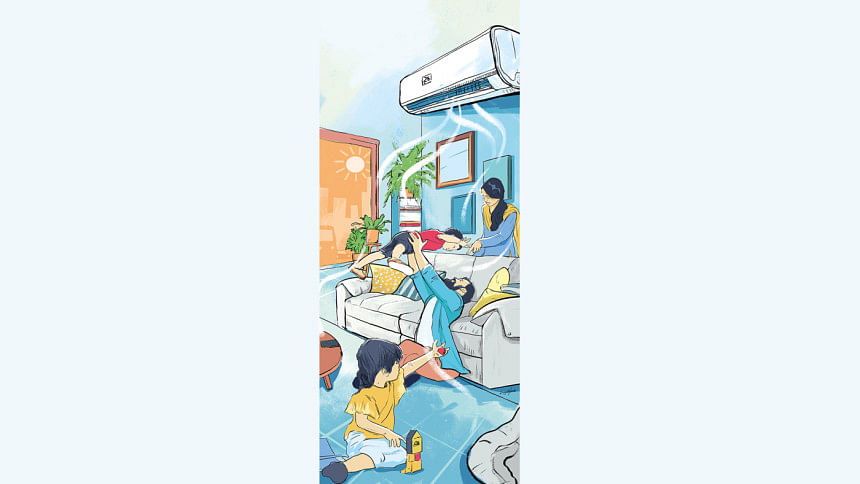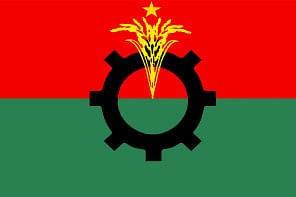Chilling the heat: Inside Bangladesh’s booming ac market

Once seen as a luxury reserved for the elite, air conditioners (ACs) in Bangladesh have become an everyday essential. Today, the AC market is booming, with locally manufactured brands leading the charge and transforming the electronics landscape of the country.
Bangladesh's journey from importer to self-sufficient AC producer mirrors its broader economic transition—from a lower-income country to a burgeoning middle-income nation. With scorching summer temperatures and a growing middle class, the demand for cooling solutions has soared. Local brands now control around 70 percent of the market, with foreign brands accounting for the rest, primarily in Dhaka and Chattogram's upscale neighbourhoods.

The shift isn't just economic—it's technological too. Inverter ACs, which consume significantly less electricity, have become the new standard. These energy-efficient units are driving both household and commercial demand, making cooling not just accessible but sustainable.
For households, ACs with capacities between one ton and one and a half tons are the most popular, with one and a half ton models in particularly high demand.
Prices vary widely by brand: one and a half ton inverter or non-inverter units range from 60,000 to 140,000 taka, while one-ton versions are priced between 40,000 and 90,000 taka. Lower-priced models, unsurprisingly, remain top sellers. Many retailers now offer easy instalment payment plans, making ownership even more feasible.
Mohammed Shafiqul Islam, Managing Director of Elite Hitech Industries Ltd, embodies this market transformation. "In 1990, I began by importing air conditioners. By 1996, I had a large showroom at Bangabandhu National Stadium. The real shift happened in 2003, when I partnered with Midea and became their Master Distributor. In 2014, I launched Elite Hitech Industries in Cumilla and began local manufacturing," he recalls. "This reduced our dependency on imports and allowed us to design products tailored for Bangladeshi needs."
Bangladeshi giant Walton is another example of local innovation. "Walton has developed the most energy-efficient air conditioner in Bangladesh, certified by BSTI," says Md. Tanvir Rahman, Chief Business Officer of Walton Air Conditioner. "It is the country's only 6-star rated AC. We also use environmentally friendly refrigerants like R-32 and R-290."
To compete, foreign brands have adapted. Companies like Gree and General, once reliant on imports, now assemble ACs in Bangladeshi warehouses, mirroring local strategies.
The demand is staggering: 600,000 to 700,000 units sold annually, with sales peaking between March and May. Eid seasons also see spikes. Inverter ACs are now preferred by most buyers for their lower electricity bills.
Today's ACs aren't just about cooling. They're smarter, sleeker, and packed with features. "There was a time when people bought ACs just to cool their rooms," says Salim Ullah Salim, Director of Marketing at Jamuna Electronics and Automobiles Ltd. "Now they want air purifiers, UV and vitamin C filters, voice control, and smart displays."
Walton even introduced the world's first offline voice-controlled AC that understands both Bengali and English. Their models also feature a 6-inch TFT display showing real-time energy use and weather data.
Beyond homes, ACs are appearing in unexpected places: village mosques, salons, convention centres—even kindergartens. Institutional installations are rising steadily, reflecting widespread adaptation.
Inverter ACs now make up 95 percent of the market. Despite being pricier, their long-term energy savings have won over consumers.
Prices, however, are climbing. "We assemble locally, but all raw materials are imported," explains Salim. "Rising global prices, a strong US dollar, fuel costs, and transportation charges have all pushed prices up."
Yet Bangladesh is not just consuming—it's exporting. Walton recently signed a five-year global distributorship deal with Singapore-based Flair M&E Pte Ltd. Today, Walton exports to 67 countries, including the US, UK, Australia, Germany, India, and Nigeria.
From luxury to necessity, from import dependency to global export ambitions—Bangladesh's AC market is a story of transformation, resilience, and cool-headed innovation.

 For all latest news, follow The Daily Star's Google News channel.
For all latest news, follow The Daily Star's Google News channel. 



Comments